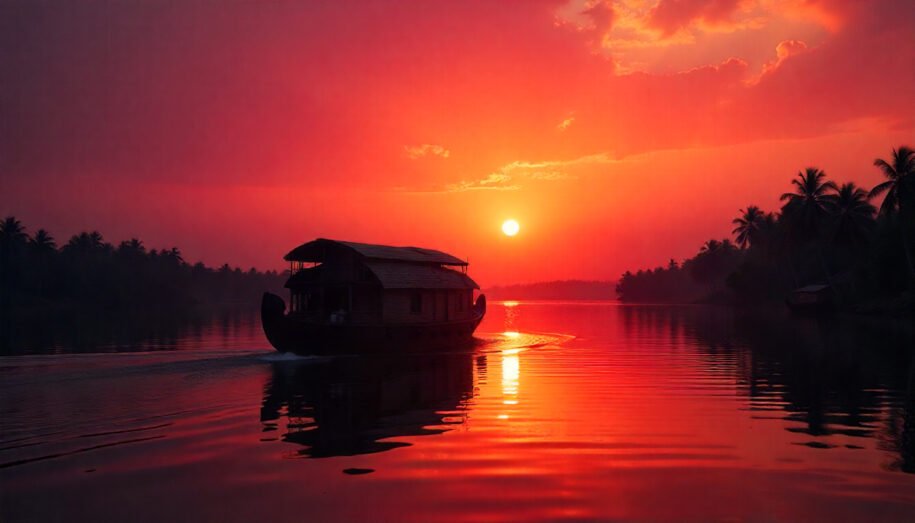Saturday wasn’t a good day for houseboat tourism in Kerala. Around 3:30 PM, a tourist boat caught fire at R Block in Kuttanad. Five people were aboard – two tourists and three crew members. Everybody got out unharmed because the crew spotted smoke early and evacuated fast, but the vessel burned down completely.
What made things worse was another boat fire the same day near Chithira Lake. Two fires in one afternoon isn’t normal. It makes travelers wonder about safety standards across the industry.
Nobody has figured out what caused either fire yet. But these events show travelers need to know what makes some operators safer than others.
Where Houseboat Fires Usually Start
Most boat fires begin with electrical issues. Older wiring, shoddy installation work, or systems that haven’t gotten proper upkeep can spark fires when they overheat. Plenty of boats look fine on the surface but have substandard electrical work underneath.
Engines cause trouble too. Boats that miss regular servicing develop heat problems in the engine area. When temperatures climb too high, materials nearby can ignite.
Cooking areas present another risk. Bad ventilation around kitchens, equipment that hasn’t been serviced, or crew who don’t know fire safety basics create dangerous situations. Even repair work causes problems sometimes – last December, welding during maintenance got out of hand and destroyed two boats.
Prevention could stop most of these problems. But prevention costs money and some operators try saving by taking shortcuts.
Kerala’s Safety Requirements
Kerala has rules for houseboats, though enforcement differs from place to place. Licensed operators must supply life jackets for every passenger, working fire extinguishers, and unblocked emergency exits. Boats need current fitness certificates and can’t carry more passengers than allowed.
Police started random inspections after earlier accidents to check licenses and safety compliance. The trouble is some operators only follow rules when they think inspectors might appear.
Crew training rules exist, but quality varies widely. Some companies give thorough emergency training. Others do the bare minimum to get certificates.
What Travelers Should Check
Ask to see life jackets before getting on any boat. They need to be within easy reach, not stuck in storage areas you’d never find during emergencies. Verify there are enough for everybody, including correct sizes for kids.
Take a walk around the boat when you board. Notice where exits are and whether you could reach them quickly if necessary. Check that fire extinguishers are visible and reachable, not buried behind decorations.
Pay attention if someone gives a safety talk. Good operators explain emergency steps and show you safety gear. If nobody mentions safety, that’s a problem.
Watch how crew members work. Experienced crews follow safety steps automatically. They wear life jackets when working near water, keep emergency gear accessible, and handle problems calmly.
Spice Routes’ Safety Approach
Spice Routes handles safety differently than many competitors. Every boat gets regular maintenance from qualified marine technicians who use proper parts instead of cheap replacements. This costs more but prevents mechanical problems that can turn deadly.
Crew members receive thorough training covering regular operations and emergency procedures. Captains know these waters well and understand safe navigation in different conditions. Kitchen staff learn proper food handling and fire prevention. Everybody knows their emergency role.
Boats meet higher standards than regulations demand. Certified technicians install and maintain electrical systems. Fire suppression systems get tested regularly. Life jackets are good quality and positioned throughout each boat for easy access.
Most importantly, Spice Routes never overloads vessels. When a boat is certified for a specific passenger count, that’s the absolute limit. No exceptions for big families or pressure to fit extra people.
Price Versus Safety
The cheapest boat options usually compromise safety. Operators competing only on price often cut spending on safety gear, maintenance, and training. They might use older boats that haven’t gotten proper updates or skip procedures to save money.
Established operators charge more because they invest in proper equipment and training. They have reputations to protect, so they work harder preventing accidents.
Check reviews carefully, looking specifically for comments about safety and crew skills, not just food quality and comfort. Ask direct questions when booking: How old are the boats? When were they last inspected? What training do crews get?
Good operators welcome safety discussions. Those who give unclear answers or try changing subjects might be hiding problems.
Tourism Response
After Saturday’s incidents, district officials will probably increase safety inspections. Tourism authorities know accidents hurt Kerala’s reputation as a safe destination.
The industry needs better rule enforcement and possibly stricter regulations. Random inspections help, but consistent enforcement would work better.
Some operators already exceed minimum requirements because they understand tourist confidence depends on safety records. Others do just enough to avoid penalties.
Smart Travel Choices
Kerala’s backwaters offer experiences you can’t get elsewhere. Most trips are totally safe when travelers pick responsible operators. Saturday’s fires remind us selection matters.
Don’t let fear of rare accidents stop you from experiencing the backwaters. Instead, research operators beforehand. Pick companies with solid safety records, proper equipment, and well-trained crews.
Trust your gut. If something seems wrong when looking at boats or talking to operators, pay attention to that feeling.
Spice Routes has hosted everybody from regular families to Dutch royalty using identical safety standards for each guest. This consistency comes from understanding real hospitality starts with keeping people safe.
The backwaters remain one of India’s most unique destinations. Pick your operator carefully, and you’ll have incredible memories without compromising safety.
